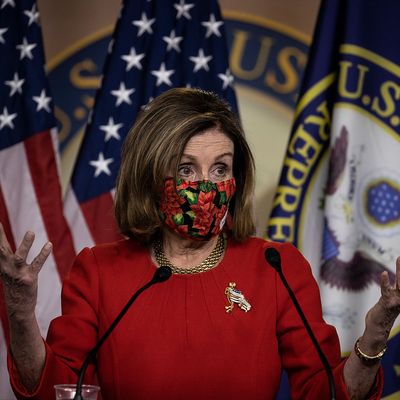
In most respects, Donald Trump’s decision to cut short his temper tantrum over the combined omnibus appropriations and COVID-19 stimulus measure that Democrats and Republicans (including his own administration) put together late last week ends one of the stranger sagas of his strange presidency. By signing the legislation between rounds of golf at Mar-a-Lago, Trump mitigated the gratuitous damage he inflicted on the unemployed whose extended benefits began to run out last week and avoided another government shutdown.
But Democrats aren’t going to let their Republican counterparts quietly put this embarrassing “toddler president” moment behind them. House Speaker Nancy Pelosi scheduled a vote on Monday on a freestanding bill (unsubtly named the Caring for Americans With Supplemental Help Act: the CASH Act) converting the $600 direct stimulus payment checks in the bill just signed by the president to $2,000, in line with Trump’s own demands.
You may rightly recall that Pelosi and her caucus brought this legislation to the floor last week. But that was a motion to pass it by unanimous consent, which of course failed like every other effort to enact substantive legislation by unanimous consent. So now, Democrats are bringing the CASH Act back for a formal floor vote in which Republicans will be forced to side with Pelosi and Trump or follow their austerity principles to a loud repudiation of such immoral generosity. The bill passed the House on Monday evening by a 275-134 margin (a two-thirds majority was required and achieved since the bill was brought up under a suspension of the normal rules), with only two Democratic dissenters, while 44 Republicans joined the push for a $2,000 check. Now Majority Leader Mitch McConnell will be forced to quash the bill as one of his final acts in this Congress or hold his own embarrassing vote.
Many Republicans will undoubtedly hide behind the demand Trump has also made to combine fatter stimulus checks with the elimination of “pork” in the omnibus appropriations bill (technically framed as “rescissions” or clawbacks of appropriated spending, requiring a process initiated by the House, which ain’t happening). But with sizable majorities of voters from both parties favoring levels of direct stimulus well above the $600 approved by Congress, it’s still going to be a difficult vote for the president’s hard-core Senate allies.






























